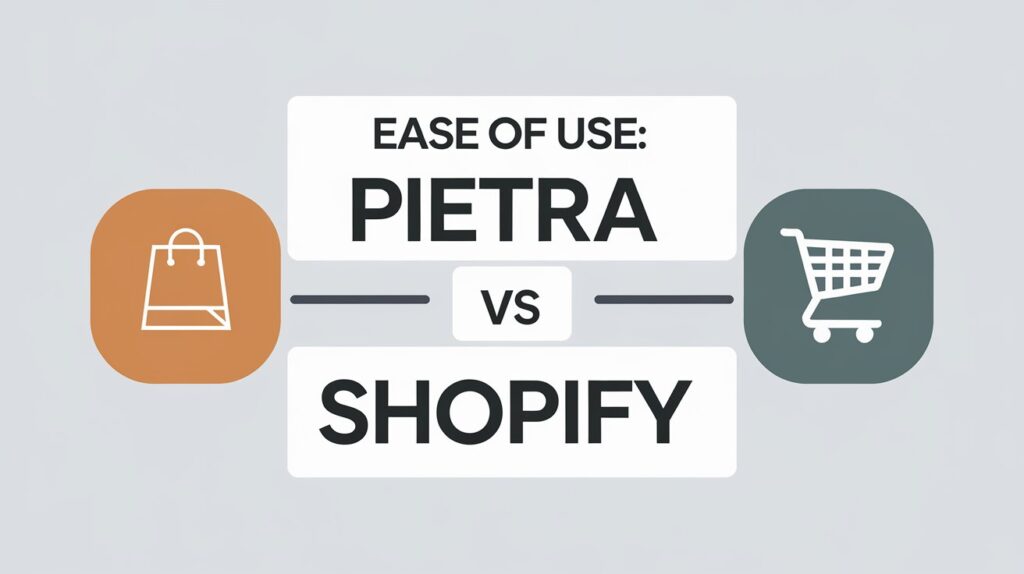Overview of Pietra and Shopify
When diving into the world of e-commerce, choosing the right platform is crucial to your success. Two popular options for beginners are Pietra and Shopify. Pietra, a newer platform, is tailored towards creative entrepreneurs and influencers looking to launch their own product lines, offering tools for everything from production to sales. On the other hand, Shopify has become a household name in the e-commerce world, known for its versatility, scalability, and user-friendly approach to online store creation. In this post, we’ll take a closer look at both platforms, comparing their features, ease of use, pricing, customization, and more, helping you decide which is the better fit for your needs.
Key Highlights
Key Features of Pietra
Pietra stands out by offering a unique end-to-end solution for creators looking to bring physical products to life. The platform goes beyond simple online store creation and includes product sourcing, manufacturing, fulfillment, and shipping services. With Pietra, users can focus on their creative endeavors while the platform handles the logistical aspects of product development. Pietra also provides tools for building a brand with its customizable storefronts, which are designed to showcase high-end, influencer-driven brands. However, compared to larger platforms like Shopify, Pietra’s feature set may feel limited for users who want deep customization or extensive third-party app integration. Despite this, it remains an attractive option for creators who prefer an all-in-one solution.
Key Features of Shopify
Shopify, known for its robust and scalable platform, provides all the essential tools to launch, manage, and grow an e-commerce business. Its feature set includes advanced inventory management, multiple sales channels (such as social media, in-person sales, and marketplaces), and flexible payment gateways. Shopify’s App Store further enhances its capabilities, allowing users to install various apps to expand their store’s functionality, including accounting tools, marketing automations, and SEO improvements. Another major advantage of Shopify is its scalability, making it suitable for both small businesses and large enterprises. Whether you’re a beginner or a seasoned business owner, Shopify offers the flexibility to build a store that matches your specific business needs.
Ease of Use: Pietra vs Shopify

When it comes to ease of use, both Pietra and Shopify cater to different types of entrepreneurs. Pietra is designed with simplicity in mind, especially for creative individuals who may not have technical expertise. The platform’s interface is clean, intuitive, and straightforward, guiding users step-by-step through product creation, branding, and setting up an online store. Its biggest appeal lies in its hands-on support for product sourcing and logistics. On the other hand, Shopify, while still user-friendly, offers a broader set of features that may require a slightly steeper learning curve. Shopify provides extensive resources, including tutorials and customer support, to help beginners navigate the platform. However, the sheer number of options and settings may be overwhelming for those who prefer a minimalist approach.
Pricing Comparison: Pietra vs Shopify
Pricing is an important consideration when choosing an e-commerce platform, and both Pietra and Shopify offer different pricing structures. Pietra operates on a subscription basis with a fixed monthly fee, allowing users to access its suite of tools, including product sourcing and fulfillment. The cost can quickly increase depending on the number of products and fulfillment services you use, making it potentially expensive for scaling businesses. Shopify, on the other hand, offers a more transparent pricing model with several tiers, starting from Shopify Lite for basic selling to Shopify Plus for enterprise-level needs. Shopify’s pricing is flexible, with added costs for third-party apps, transaction fees, and advanced features like automation and analytics. For beginners, Shopify’s basic plan is often more affordable and scalable, whereas Pietra may be costlier due to its all-in-one services.
Customization and Design Options
In terms of customization and design, Shopify is known for its extensive options. With a vast selection of professionally designed themes and templates, Shopify gives users the ability to create a visually appealing online store that matches their brand. Many themes are responsive and customizable, and for those with coding knowledge, the platform allows further customization through HTML, CSS, and Liquid, Shopify’s templating language. Pietra, in contrast, offers fewer customization options but focuses on high-end, clean designs tailored to influencer brands. While Pietra’s design templates are easy to use and beautiful, they are not as flexible as Shopify’s. Shopify’s extensive theme library and ability to incorporate custom code make it the better option for users who need deep customization and design freedom.
Integrations and Third-Party Apps
When it comes to integrations and third-party apps, Shopify clearly leads the way. With its expansive App Store, Shopify users have access to thousands of apps that can extend the functionality of their store, covering areas such as inventory management, marketing, accounting, and customer support. Whether you need to integrate with a CRM, set up automated email campaigns, or add new payment gateways, Shopify’s ecosystem has an app for almost every need. Pietra, however, is more limited in this regard. Since Pietra is designed to be an all-in-one solution for product creation, branding, and sales, it doesn’t rely heavily on third-party apps. While this can be convenient for users who want everything in one place, it may feel restrictive for businesses that need specialized tools or more advanced customization.
Marketing and SEO Tools

Both Pietra and Shopify offer a range of marketing tools, but Shopify has a more comprehensive set of features, especially when it comes to SEO (Search Engine Optimization). Shopify’s built-in SEO tools allow users to optimize their store for search engines by customizing meta tags, product descriptions, URLs, and more. Shopify also provides integrations with marketing platforms like Google Ads, Facebook, and Instagram, making it easier to run targeted ad campaigns and track performance. Pietra, while offering some basic marketing tools like email campaigns and social media sharing, is not as robust in this area. Shopify’s extensive app integrations also allow for more advanced SEO and marketing solutions, giving users an edge in driving traffic and increasing sales. For businesses focused on long-term growth and visibility, Shopify’s marketing and SEO capabilities are more comprehensive than Pietra’s.
Customer Support and Resources
When it comes to customer support, both Pietra and Shopify provide assistance, but Shopify’s support system is more extensive. Shopify offers 24/7 customer support through various channels, including live chat, phone, and email. It also has a rich knowledge base, offering guides, tutorials, and community forums where users can find answers to common questions. Shopify Academy provides in-depth training for users who want to master the platform. Pietra, though supportive, offers a more limited customer service experience. The platform does provide onboarding and assistance, particularly with product creation and fulfillment, but it doesn’t have the same breadth of resources that Shopify does. For beginners, Shopify’s extensive support network can be incredibly valuable, offering help at every stage of building and running an online store.
Which Platform is Best for Beginners?
When it comes to choosing a platform for beginners, both Pietra and Shopify have their strengths, but Shopify holds a slight edge due to its balance between ease of use and scalability. Pietra is an excellent choice for creative entrepreneurs and influencers who want a streamlined, all-in-one solution for product development, from sourcing to shipping. Its simplicity and guided approach make it ideal for users who prefer a hands-off approach when it comes to logistics. However, Shopify offers a broader range of features and flexibility, making it suitable for a wider audience, from beginners to established businesses. Shopify’s intuitive interface, combined with its vast resources and 24/7 customer support, makes it a more scalable option for users who want to start small but eventually grow their business. For beginners who seek long-term growth, Shopify provides more comprehensive tools and adaptability.
Conclusion: Pietra or Shopify – Which Should You Choose?
In conclusion, the choice between Pietra and Shopify ultimately depends on your specific needs and business goals. If you are a creative individual looking to quickly launch a brand and need help with product sourcing and fulfillment, Pietra might be the perfect fit. Its focus on simplicity and high-end branding makes it ideal for influencers and artists. However, if you’re aiming for long-term growth, require extensive customization, and plan to integrate with various third-party apps and marketing tools, Shopify is the more robust and versatile platform. Shopify’s flexibility, vast app ecosystem, and comprehensive marketing tools give users the power to build a store that can grow alongside their business. In short, Pietra is great for niche creators, while Shopify is a better choice for those who want a scalable, feature-rich solution.
